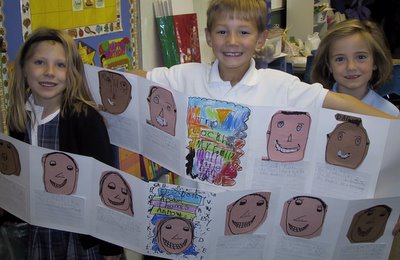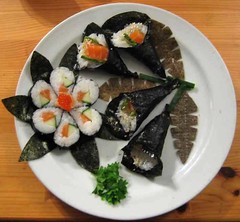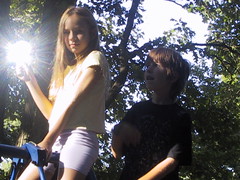
Wednesday, November 30, 2005

But won't you be ashamed
To count the passing year
At its mere cost, your debt
Inevitably paid?
For every year is costly,
As you know well. Nothing
Is given that is not
Taken, and nothing taken
That was not first a gift.
The gift is balanced by
Its total loss, and yet,
And yet the light breaks in,
Heaven seizing its moments
That are at once its own
And yours. The day ends
And is unending where
The summer tanager,
Warbler, and vireo
Sing as they move among
Illuminated leaves.
~ Wendell Berry ~
Sunday, November 27, 2005


A man goes into a bar with his little Jack Russell terrier. He puts the dog on the bar stool next to him. The bartender wanders over and the man says: "I'll have a pot thanks, mate." The dog says: "I'll have the same."
The bartender does a double- take and looks over to the dog and asks: "Did you just talk?"
"Yep," says the dog. "My God! That's incredible. This is unreal. Who would have thought: a talking dog, here in my bar? Tell me more about yourself. You must have had an amazing life as a talking dog."
The dog assumes an indifferent pose and speaks in quite a matter-of-fact manner.
"Yeah, you could say it's been a journey. I trained for a while with the US Marines. Saw a bit of action in Iraq - can't tell you more. I joined the Bolshoi Ballet for a stint. That was hard work but incredibly satisfying. I've written a few best-selling novels in my spare time. That was good fun. Of course, there have been film offers, TV shows. Wine, women and song. All that."
The bartender is now purple with excitement. He turns to the man. "We could make a fortune. We could charge people to come into this bar and hear your dog talk. How much would you charge to allow your dog to talk here?"
"About $10," the man replies.
"Why only $10 - that's madness," exclaims the bartender. The man answers: "He's a liar. He hasn't done half those things."
Monday, November 21, 2005
CAMIO: On-line Images

Testing an image database of online Art Museum Images. These are wonderful tools for teaching - in any subject - but particularly in art history and studio art/design courses. We are finding them great resources at MIAD as are many other educational institutions.
Their description (via MIAD Librarian, Cynthia Lynch):
Camio offers right-cleared, high quality art images for class projects, art history and studio art programs, course Web sites, lectures, presentations, and research resources. Access by subscription is available to universities and colleges public libraries, museums and schools.
I am counting on the fact that this blog is utilized (among other things) as a "course web site" and seeing how this works for posting images.
Your looking at:
OCTOPUS AND MELON, 1989
Michiko Kon, Japanese b. 1955
Getalin Silver Print
Cleveland Museum of Art
Lovely isn't it?
Sunday, November 20, 2005
Homespun Magixx - Downloads

There are all sorts of free downloads on this site - enough to keep anyone occupied for hours....links to other interesting places and some great paper engineering ideas.
Friday, November 18, 2005
The Midnight Special - Folk Music with a Sense of Humor

Driving back to Milwaukee on 65 through Indiana - late night, lots of trucks, big moon lighting up the fields and this music coming from the radio - wonderful, rich, grand music. It is this show - the Midnight Special. I get to my hotel room - I have to stop - it's well past midnight and I am way too tired to keep driving. I go immediately to their website - the playlists (with links). Ahhh - I love the way I can find all of this.
Thursday, November 17, 2005
Book Art


Spending the week in Versailles, Kentucky making books with all of the young people at St.Leo's Elementary School. Every grade level is making a different book structure - and working with a different theme. Rose and I are organizational wizards - it is always easier with two. She doesn't have a classroom - so we prep, pack, get in, work with kids, clean-up, and get going to the next room.
Teachers of young children: truly the unsung heroes of our time. More pictures to follow.
Friday, November 11, 2005
The First Sports Post
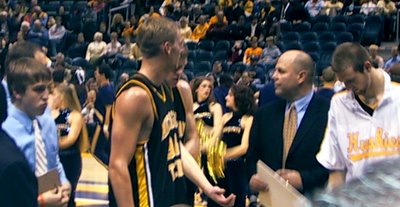


I have been told (by those that know) that the current state of NBA basketball is a sorry one. Flaccid and boring - even people who normally get excited about such things are not happy campers. Not so last evening - when the Huskies from Michigan Tech hit the court against the (this week) Golden Eagles from Marquette University. Gritty and raw - the game was a knuckle-whitener from beginning to end.
Can too much be said about the performance of number 21? One thinks not.
Thursday, November 10, 2005
flora_arje.jpg
Tuesday, November 08, 2005
Monday, November 07, 2005
Marjane Satrapi at Coastal Carolina University Ourmedia
ON WRITING PERSEPOLIS
By Marjane Satrapi, as told to Pantheon staff
 Chances are that if you are an American you know very little about the 1979 Iranian Revolution. "This revolution was normal, and it had to happen," says Marjane Satrapi, author of Persepolis, a totally unique memoir about growing up in Iran after the Shah left power. "Unfortunately, it happened in a country where people were very traditional, and other countries only saw the religious fanatics who made their response public." In her graphic novel, Satrapi, shows readers that these images do not make up the whole story about Iran. Here, she talks freely about what it was like to tell this story with both words and pictures, and why she is so proud of the result.
Chances are that if you are an American you know very little about the 1979 Iranian Revolution. "This revolution was normal, and it had to happen," says Marjane Satrapi, author of Persepolis, a totally unique memoir about growing up in Iran after the Shah left power. "Unfortunately, it happened in a country where people were very traditional, and other countries only saw the religious fanatics who made their response public." In her graphic novel, Satrapi, shows readers that these images do not make up the whole story about Iran. Here, she talks freely about what it was like to tell this story with both words and pictures, and why she is so proud of the result.After I finished university, there were nine of us, all artists and friends, working in a studio together. That group finally said, "Do something with your stories." They introduced me to graphic novelists. Spiegelman was first. And when I read him, I thought "Jesus Christ, it's possible to tell a story and make a point this way." It was amazing.
 Writing a Graphic Novel is Like Making a Movie
Writing a Graphic Novel is Like Making a Movie People always ask me, "Why didn't you write a book?" But that's what Persepolis is. To me, a book is pages related to something that has a cover. Graphic novels are not traditional literature, but that does not mean they are second-rate. Images are a way of writing. When you have the talent to be able to write and to draw it seems a shame to choose one. I think it's better to do both.
We learn about the world through images all the time. In the cinema we do it, but to make a film you need sponsors and money and 10,000 people to work with you. With a graphic novel, all you need is yourself and your editor.
Of course, you have to have a very visual vision of the world. You have to perceive life with images otherwise it doesn't work. Some artists are more into sound; they make music. The point is that you have to know what you want to say, and find the best way of saying it. It's hard to say how Persepolis evolved once I started writing. I had to learn how to write it as a graphic novel by doing.
What I Wanted to Say
I'm a pacifist. I believe there are ways to solve the world's problems. Instead of putting all this money to create arms, I think countries should invest in scholarships for kids to study abroad. Perhaps they could become good and knowledgeable professors in their own countries. You need time for that kind of change though.
I have been brought up open-minded. If I didn't know any people from other countries, I'd think everyone was evil based on news stories. But I know a lot of people, and know that there is no such thing as stark good and evil. Isn't it possible there is the same amount of evil everywhere?
If people are given the chance to experience life in more than one country, they will hate a little less. It's not a miracle potion, but little by little you can solve problems in the basement of a country, not on the surface. That is why I wanted people in other countries to read Persepolis, to see that I grew up just like other children.
It's so rewarding to see people at my book signings who never read graphic novels. They say that when they read mine they became more interested. If it opens these people's eyes not to believe what they hear, I feel successful.
Sunday, November 06, 2005
A Daily Dose of Architecture: Follow-up #1: Water Tanks
Chicago Architecture Club has recently announced the winners of Chicago Prize for 2005: Water Tanks, a competition that challenged entrants to salvage a part of Chicago's urban fabric, the industrial water tank, through creative reuse and preservation.
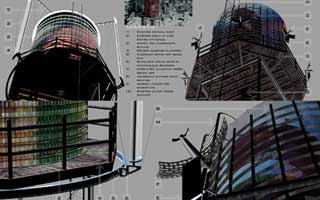
First prize went to Rahman Polk who had imagined to turn Chicago's water tanks into a network of electricity-generating wind turbines...water tanks around Chicago would be transformed into a network of electrical generators that would create a citywide, publicly accessible WiFi network and use LED displays to broadcast Webcasts, cultural exhibits, Amber alerts, weather warnings and other public service announcements."
Another interesting design, "Sanctuary," won an honorable mention for its vision of the water tanks as UN-administered refuges for people seeking political asylum or those fleeing detention by the U.S. government.
(Originally seen on "WE MAKE MONEY-NOT ART")
Thursday, November 03, 2005
about del.icio.us

This is from: Joho the Blog: [berkman] Joshua's news.
If you aren't using del.icio.us yet - I really encourage you to check it out.
Joshua Schachter of del.icio.us is giving a lunchtime talk. His presence has sold out the small conference room at the Berkman Center so we've moved to a bigger room.
What follows are paraphrases of what he said; I am certain not only to have omitted much but to have gotten stuff wrong, so before you get pissed at Joshua for saying x, you might want to check that he in fact didn't say y and I said he said x.
He built delicious in 2003 to manage his own links. He had been using a text file, but twenty entries into it he had already introduced a tag into it.
Currently at delicious: 5M links, about 10M posts, on average about two tags per item. About 500,000 unique tags. Growth in tags is slow.
The Chinese firewall blocks delicious now.
Hard core tech pages have gone from 25% to 17% over the course of this year. "So interests are starting to broaden."
Q: How would you describe delicious to a layperson?
A: It's a way to remember stuff. Links initially but we're adding some new types.
Q: Delicious is aggressively without a user interface, so I think of it as a pipe instead of as a consumer destination...
A: I've finally hired people who have a different sense of user design than I do. We've done a round of UI testing — the one-way mirror, etc. That was an entirely terrifying day. Once they figured out the point and got through the URL, people like the interface. It does what it does without a lot of jokey stuff, etc.
The API: People do get value out of it, but it's also a political statement that it's your data. Plus I'm lazy.
Q: What's the financial model?
A: The same as any other advertising-backed discovery engine, like Google. The people who are using it are paying us with information. Ten times the number of people are on the site but not signed in than those who are signed in.
Q (me): Which are you going to push, the individual or social uses?
A: You won't use it if it's not useful to you. But we'll put in more social structure. Group tags are coming — tags that are lightly permissioned. You'd tag it as for a group, e.g., "groupname: tag." (Example: nptech, a tag used by people in the non-profit tech field.) In the case of people collectively organizing around a tag, I think you want to amplify that. We're trying to put in privacy now; it's a little bit of a challenge to do and keep it fast.
I worry about systems that stay in stealth mode. There's stuff you're not learning. We generally push code out to the live site 2-3/week.
Q: Say more about group tags and privacy...
A: Items can be private. If it's tagged for you or your group you'll be able to see them. The items won't be visible (in order to avoid problems with totalitarian governments.)
There are 8 people at Joshua's company now.
Q: Why "tags" instead of "keywords" in coming up with the terminology?
A: It was inadvertently clever. I wish I could say I did it intentionally. Typically, when keywords are used, you don't see a list of the aggregated keywords. Maybe it is a slightly new thing.
Q: (me) Will we see typed tags, e.g., for events you get a field for time and a field for place?
A: I would like to store more rich datat types but that won't happen immediately, e.g. contacts and events. You can make a date tag now: "date._____" There's stuff about the url, stuff about the post, stuff that belongs to you. E.g., if you bookmark an Amazon url. I could go get the bookcover, the price, etc. Then how do you represent them. We have to figure out how to do that once we've got performance up.
Q: As delicious scales, certain tags become meaningless. E.g., the "china" feed is pretty useless. But if I could specify subsets or groups...
A: You'd create a group and let people in. It will be implemented as a tag, so you could get a feed of (say) "berkman" and "china." (With your inbox you can map tags, i.e., this person's "china" is that person's "asia.") We have something called "the nework" coming; I originally called it "friends" but that was somewhat creepy. You identify people as being in your network and get feeds from them. [A group will be an established set of people who opt in. A network is a set of people you designate; they will not know they're a member of your network. I point out that flickr tells you. Joshua says that every time he gets a notice from some random person that he's been added as a contact "I want to rip my face off."]
I'm not trying to build up the delicious community. There are plenty of communities.
Almost no one subscribes to a person/tag. Most subscribe either to a person or a tag. So, if you bookmark something and someone else has notes (nee "extended") on that thing, you'll be able to see them in your inbox. ("Inbox" is badly named, Joshua says.)
About a third of people who create accounts never come back.
